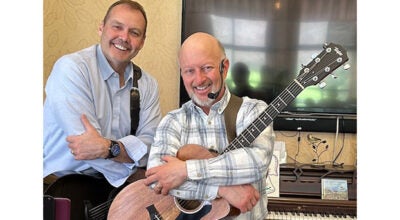How to avoid probate
Published 9:01 am Friday, March 12, 2010

Rotary Club President Cathy Merrill welcomes Portage Noon Rotarian William R. Wieringa to Dowagiac March 11 for the attorney's talk on estate planning. (The Daily News/John Eby)
By JOHN EBY
Dowagiac Daily News
Do you need a will? Not if you don’t have a spouse or children and you don’t care what happens to your money and possessions after you die.
Otherwise, if you have minor children, if you own assets valued at $20,000 or more, if you wish to determine your beneficiaries and what they will receive from you, if you wish to appoint the person who will administer your estate or if you wish to leave instructions about your funeral or burial, you need a will, Portage Rotarian and attorney William R. “Bill” Wieringa told the Dowagiac club Thursday noon at Elks Lodge 889.
Since wills must be probated, other estate planning documents can be added to avoid this lengthy, expensive and public process.
Wieringa also discussed revocable grantor trusts, also known as living trusts. This is a legal entity used to hold legal title to property for the benefit of one or more persons.
If properly drawn and funded, a trust can be extremely helpful in many instances, such as:
• To avoid probate: A living trust does not die when its creator does. The successor trustee can take over management of the trust estate and pay bills and taxes and promptly distribute the trust assets to the beneficiaries without court supervision, if the trust agreement gives the trustee that power. This avoids the expense and delay of the probate process and allows trustees to distribute assets to your beneficiaries quickly and without challenges that can occur in formal probate.
• To maintain privacy: Trusts, unlike wills, are generally private documents. Anyone would be able to see how much you had and who your beneficiaries were with a will, but usually not with a trust.
• To avoid a conservatorship. If the trust creator becomes disabled, a successor trustee can step in and take over estate management without the delay and expense of going to court to appoint a conservator.
In many estate plans, the trust is the central tool to control and manage property. A trust continues despite the incapacity or death of the trust creator. It determines how property is to be distributed after the death of the trust creator.
A trust is easily used in conjunction with other estate planning methods.
It can be changed in any manner, or revoked altogether, at any time as long as the creator is alive and competent.
“With a trust,” he said, “you get some control beyond the grave.”
Who needs a trust instead of a will? If you have minor children, if privacy is important to you, your business or your family, if you own real property – particularly any property outside of your home state – if you wish to avoid conservatorship or probate or if your estate is valued in excess of $1 million to avoid estate taxes.
A trust is not necessary for everyone, but Wieringa recommends discussing it with an estate planning attorney.
“Probate is nothing more than a legal process to determine if there is a valid will,” Wieringa said. “The court makes sure the deceased person’s outstanding debts are paid and helps make sure that the assets get distributed according to what it says in the will. They carry out the intent of the person who made out the will. Probate’s a good thing, but some people want to avoid it. Actually, the only reason for probate is to change the title from a deceased person’s name to a live person’s name because dead people can’t own stuff.
You’ve heard, ‘You can’t take it with you,’ well, legally you can’t. As soon as you assume room temperature you lose your right of ownership. When someone owns something solely in their own name, that has to be a probate asset and the court has to decide who is the proper person for that asset to be retitled to.”
Though “everybody needs a will,” he said, 70 percent of Americans don’t have one.
“Wills are great because they express your wishes. Also, they’re enforced by the Probate Court. And wills are where minor children get assigned. Young people don’t think about that because they’re bulletproof and immortal and nothing can happen to them – until it does.”
Assets to be probated “can be anything,” Wieringa said. “It can be houses, cars, cash, investment accounts, jewelry, personal items, furniture. Anything that has value that someone owns in their own name at the time of their death.”
The probate process is expensive, he said, pausing to watch three deer cross the golf course. “Anywhere from 3 percent to 10 percent of the assets of an estate get used up” by accountants, appraisers and court costs, including an inventory fee based on a percentage of total assets.
“The biggest cost is attorneys’ fees,” he said. “Those bloodsuckers will drain you dry, so people want to avoid that if they can.”
Probating an estate routinely consumes a year to two years.
“That’s only if it’s a simple one and is not complicated or contested,” Wieringa said. “There are timelines built in that naturally take that long. The quickest one I’ve done personally was nine months because the son was the only one who was going to inherit anything and he was the personal representative of his father, who had been in a nursing home for several years. After a personal representative turns in the death certificate and will to the court they put notice in the legal listings of the paper. That starts a clock running of 120 days that creditors have to make a claim against the estate. There’s four months right there. Income tax also has to be done. Uncle Sam takes a bite out of you even after you’re dead based on the number of days you were alive. The court has to be sure that has been done before it closes out the estate. They don’t want to distribute all the funds, then find out there’s a tax liability.”
“What it does to families is the toughest part,” Wieringa said of wills’ contestability. “People who have been loving family members for decades – siblings, cousins – all of a sudden sometimes are like vultures on a carcass when it comes to a probated estate. Sometimes it’s not even about money, it just picks at old family wounds that never got resolved.”
He mentions the Smothers Brothers comedy bit about how their mother favored Dick over Tom and a woman who was his client last year. “She said, ‘I know what you mean. Fifteen years ago my mom died and my sister and I, unbeknownst to each other, asked her if we could have grandma’s antique soup tureen. It’s got a big crack in it and wouldn’t be worth 50 cents at a garage sale, but it sat on her kitchen table and reminded us of grandma and Sunday dinners. Mom had dementia and forgot she promised it to each of us … we haven’t talked to each other in 15 years.’ ”
Do-it-yourself methods people come up with to avoid probate Wieringa equates with juggling skunks.
“You can work at it really hard and practice and pay attention and maybe not drop any and maybe not get scratched, but you probably won’t come away smelling too good.”
Joint ownership seems attractive, but “that just postpones it, because guess what? Mom’s going to die, too. You put oldest son’s name on every asset, it’s difficult to remove the name of a co-owner. You might not be able to get it back if you need it or want it,” Wieringa cautioned.
“Let’s say we put Junior on the house, then Mom and Dad decide they hate Michigan winters. They sell the old homestead and move to St. Petersburg to live out their golden years where it’s warm. Junior’s on the title and he says no, he wants it when they die. Every joint owner has to sign off. They can’t even borrow money on the homestead without Junior and maybe his spouse signing off.
“Another reason that could cause problems is the survivor owns things outright. Suppose Mom and Dad intended that Junior share it with three other brothers and sisters when they’re gone. He doesn’t have to. What happens if Junior has a legal problem even while Mom and Dad are still alive? He gets sued or divorced. Any settlement against a owner, their assets can be attached to satisfy the award of that legal proceeding. Mom and Dad might have to sell the house to pay off Junior’s ex-wife. There are liabilities in joint ownership people don’t think about. It’s true you can give away $13,000 a year without incurring gift tax, but there are problems. Who here knows when you’re going to die unless you’re planning suicide? It’s hard to come up with a plan to give away your last buck with your last breath.
“Also, you lose control of that money, and sometimes near the end of your life, with more medical bills coming in, or you need a nursing home or assisted living, that’s when you need your money the most.
“The problem with leaving money to minors is that they can’t inherit until they’re 18, so it goes to conservators for their benefit. As soon as they turn 18, they get that money, free and unfettered. I can just barely remember when I was 18. I wasn’t making good financial decisions. If I got a chunk of change I probably would have bought something red and shiny and driven to Vegas – and come home two weeks later on a bus.”
Two other documents he touched on are durable power of attorney and durable power of attorney for health care.
Wieringa, a member of the Portage Noon Rotary Club, spoke as the guest of Don Hallowell.
Wieringa earned his undergraduate degree from Grand Valley State College and his law degree from Thomas M. Cooley Law School starting at age 51 and graduating cum laude when he was 55.
Law is his second career after 20 years in industrial supervision and management and 12 years in human resources management. He commuted to law school from Kalamazoo, where he worked fulltime in HR for a paper mill while attending classes on weekends.
Married to his second wife for 17 years, Wieringa has three grown children and is grandfather to six “good-looking, intelligent angels.” His daughter is about to deliver his seventh grandchild in two weeks.
Starting law later in life, he works differently than fellow attorneys, such as he does not have an office, but visits clients in the comfort of their own homes.
He specializes in “the concerns of mature individuals,” including estate planning, probate and elder law.
He is a hospice volunteer and visits a 101-year-old man.
“We have the same conversation over and over, but I love him.”
Wieringa’s is the rare Rotary program that comes with a disclaimer.
His presentation is for informational purposes and does not constitute legal advice or establish an attorney-client relationship.






